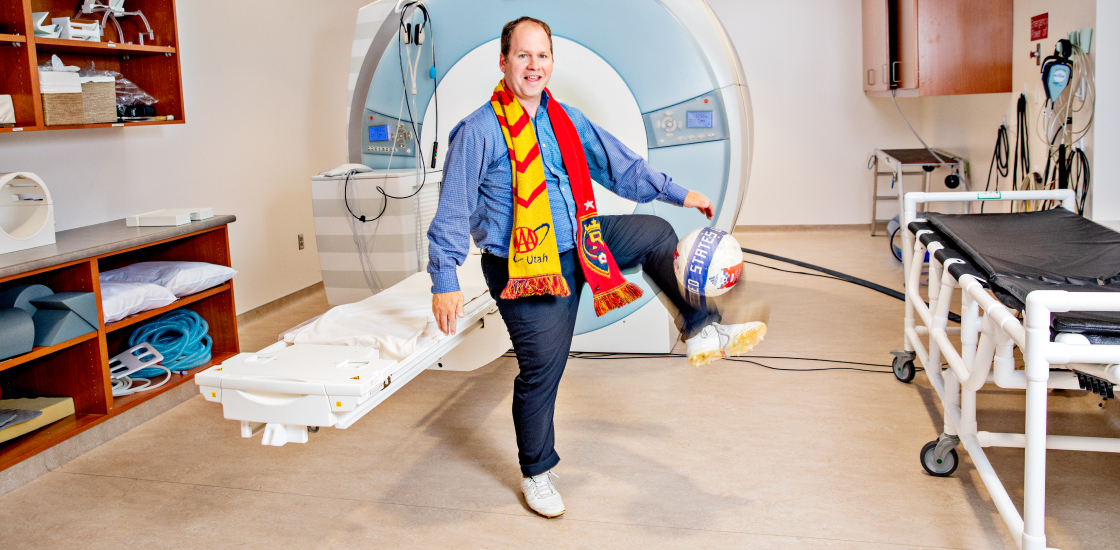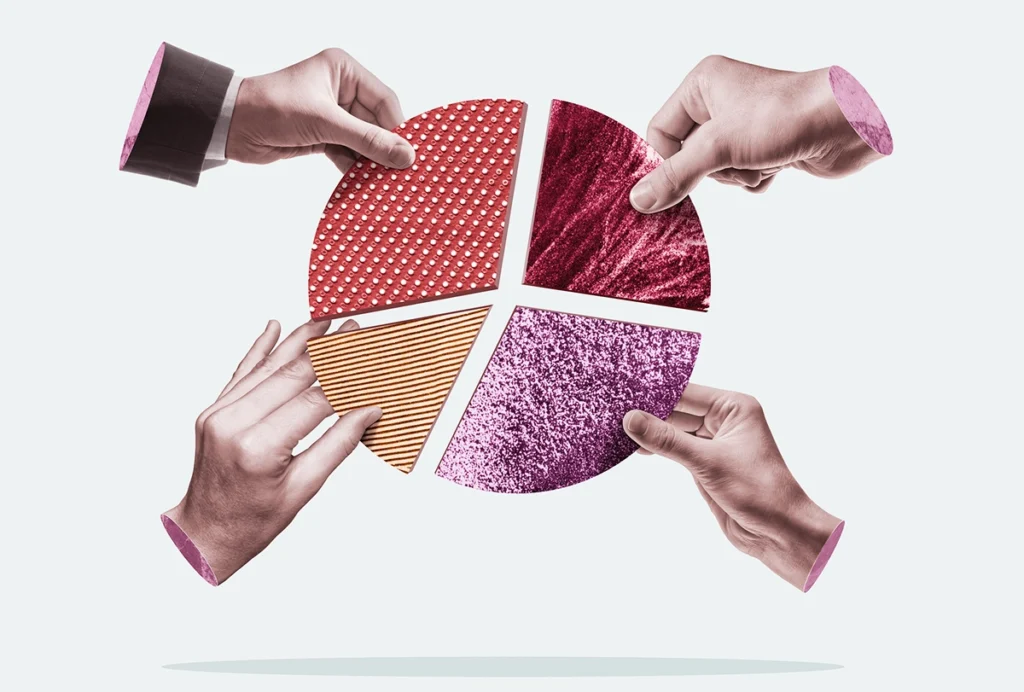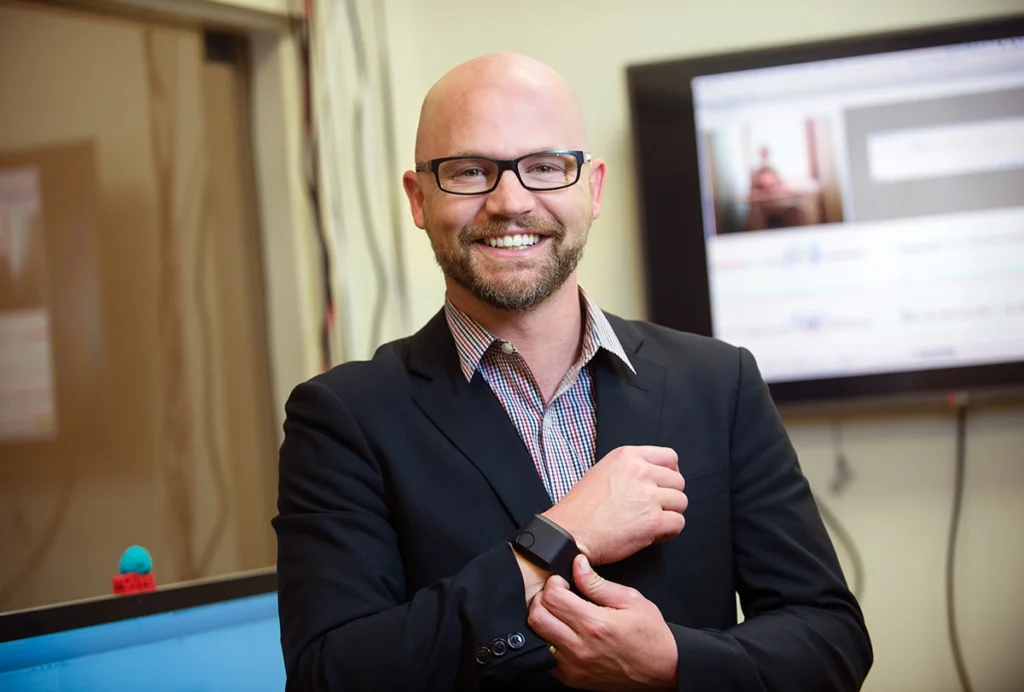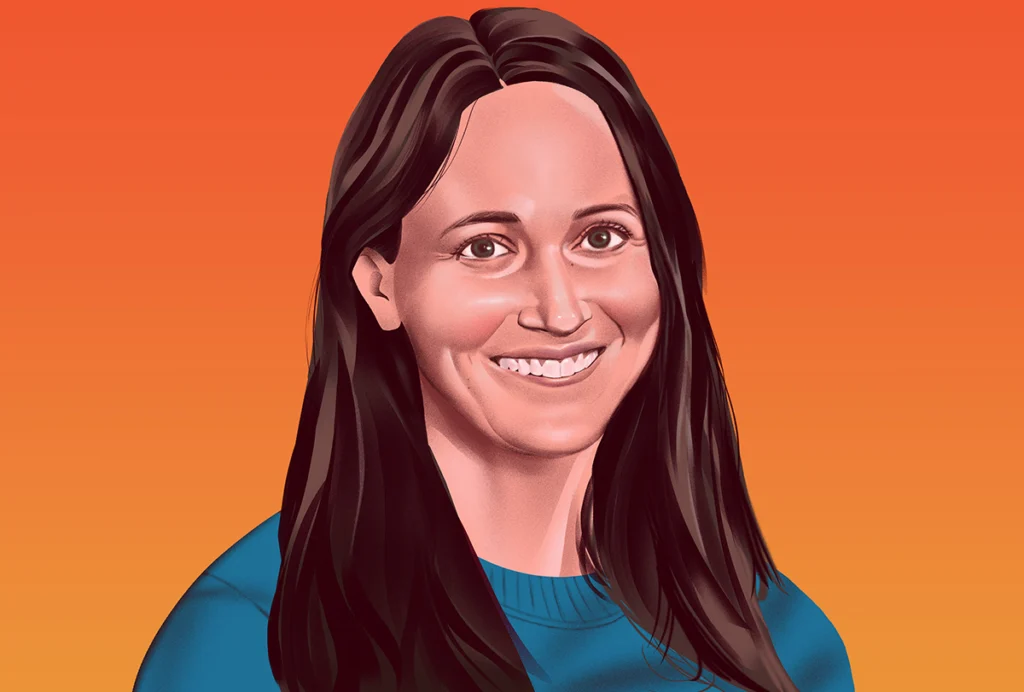No day for Mikle South is like any other.
Over the course of a year, he teaches five courses in psychology and neuroscience at Brigham Young University in Provo, Utah, and he spends much of his time preparing lectures, grading exams, meeting with students — and playing soccer.
Each week is also punctuated by a single clinic day, which he spends doing diagnostic assessments for autism. And — in the time left — he runs a lab in which he studies anxiety in autistic people, using tools such as brain imaging to probe the body’s responses to stress. He has also begun studying how sleep disruptions in autistic people relate to their anxiety.
South gets little sleep even when he finally reaches home: It is the only place he can work uninterrupted. He talked with Spectrum about the fascinating overlap between autism and anxiety, how he tackled his fear of heights and how he copes with living in a conservative state.
Spectrum: What big question drives your research?
Mikle South: My team is interested in why so many autistic people have anxiety. Are there unique things about autism that affect anxiety? Is the experience of anxiety different in autistic people than in others? What factors make anxiety such a challenge for many autistic people? One of our ideas is that maybe autistic people’s bodies feel more sensations than others do and are therefore often overstimulated. If your sensory processing is a little off, you might constantly be trying to figure out what the world is telling you. That makes you feel uncertain, which in turn makes you feel anxious.
S: Whose work do you admire?
MS: Jacqui Rodgers, Susan White, Carla Mazefsky, Connor Kerns: All of these researchers are excellent clinicians too, and they have a keen sense of the clinical relevance of their work. They are very sensitive and try hard to understand the perspective of the people they’re working with, rather than imposing their own or society’s expectations. I admire that about all of them.
S: What does a typical day look like for you?
MS: I have teaching days, clinic days, meeting days and sometimes research days. I typically have between one and three meetings a day, plus lots of meetings with students about research and life issues. Don’t even ask about sleep. Someone from the campus newspaper once interviewed me about the psychological benefits of sleep; one of my research assistants was in the room and was laughing the whole time because she knows how little I sleep.
S: When and where are you most productive?
MS: At home as often as possible, but unfortunately usually late at night (ergo the sleep issue). My wife and I are about two months away from being empty nesters, and so we bought a townhome and our top floor has two balconies and lots of windows overlooking a lake. We each have a desk set up there, so I like to go sit at my desk. When I’m at work, people stop by my office all the time. I love all of my students and the people that come see me, but it’s a lot easier to work without interruptions.
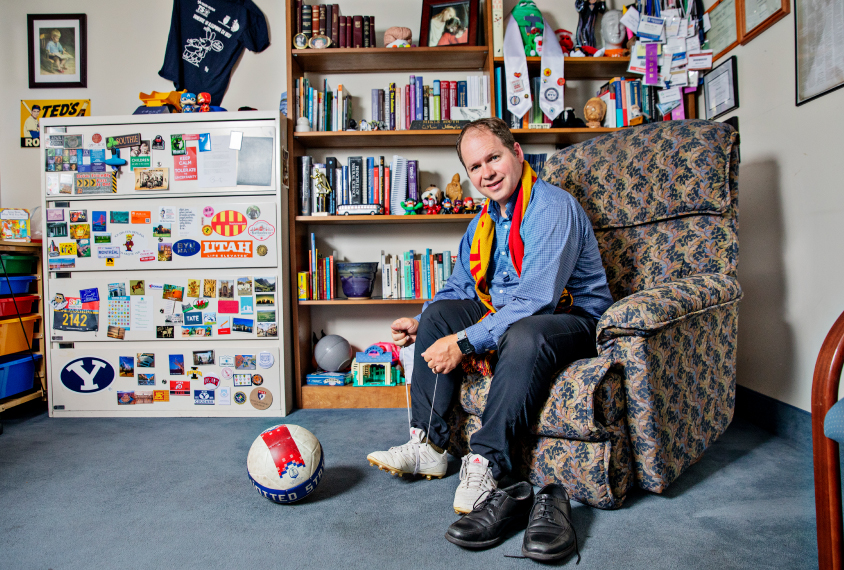
S: Do you listen to music or podcasts while you work?
MS: I always listen to music, with changing moods. Sometimes it’s classical music (Beethoven and the Romantic composers); sometimes it’s pop or rock from 1960s onward (U2, Simon and Garfunkel, Pink Floyd, Mumford and Sons). Recently I discovered the jazz pianist and singer Diana Krall; her music is very soothing to work to.
S: Tell us your favorite story from a research conference.
MS: I’m terrified of heights, and at one conference in Toronto, my research assistants convinced me to visit the glass floor high up on the CN tower. They coached me to crawl out on the floor a little at a time over the course of 20 or 30 minutes until I was able to stand up and look down — though it still makes me anxious to think about it. I had closed my eyes on the elevator up but was able to keep them open on the way down.
S: What are you reading right now?
MS: I’m listening to the audiobook “Sapiens: A Brief History of Humankind” by Yuval Noah Harari during my commute. The author asks interesting questions, but his answers are mostly unsatisfactory. He gives quick and dirty summaries of everything but doesn’t do any topics proper justice. One of his common argument strategies is: We haven’t found evidence for it, therefore it must not be true. He uses this strategy when talking about prehistoric cultures and also modern neuroscience. For instance, he says neuroscientists have never found a ‘God spot’ in the brain, a region responsible for religious experiences; therefore God doesn’t exist. Making claims based on the absence of evidence is bad science.
S: Are you active on social media?
MS: I try to be a bit disruptive on social media. I’m fairly liberal and I live in a very conservative state, and so I’m often poking at the assumptions I see in conservative viewpoints. It’s how I survive in a highly religious, highly conservative culture.
I mainly use Facebook for social issues and, sometimes, Twitter for autism research and to see the language used about autism. I follow a lot of autistic self-advocates on Twitter, which helps broaden my perspective. In June, I noticed a tweet criticizing the language used in an article about autism. The article used a lot of pathological terms — referring to autism as a disease, a disorder, with all sorts of problems and impairments. An autistic woman highlighted some of this language in a screenshot, which I sent around to my co-editors at the journal Research in Autism Spectrum Disorders. After a robust discussion, we altered our guidelines for authors on how to talk about autism in articles they submit to the journal.
A thread, fixing another research paper. This one. https://t.co/cYsNmB4Hdh
It is about wearable tech and autistic people, but its summary of autism is a shocker. Look.
Here we go on this rollercoaster ride…hold on…/ pic.twitter.com/ffrR2I7Clb— Ann Memmott PGC (@AnnMemmott) June 23, 2019
S: What do you eat or drink while you’re working?
MS: My wife, Kristin, is fond of Crio Bru brewed chocolate — it has virtually no calories, very little caffeine — which I drink when at home. At my office, unfortunately, I’m just across the street from the BYU creamery, which has excellent ice cream. I like pizza, but I used to live in New Haven, Connecticut, which has the best pizza in the United States, and so I’m a pizza snob. There are about two good places in the state of Utah where I can eat pizza.
S: What do you like to do for fun?
MS: I love playing soccer. I’m on an intramural soccer team that’s all faculty members. We play in the student league and our motto is: “Schooling BYU students since before you were born.”
S: How many unread emails are in your inbox right now?
MS: 2,419. Ouch.
